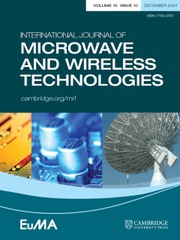A 280 W LDMOS broadband Doherty PA with 52% of fractional bandwidth based on a multi-line impedance inverter for DVB-T applications
Published online by Cambridge University Press: 07 April 2016
Abstract
We introduce a new technique for the design of an output combiner for Doherty power amplifier (DPA) and its effective exploitation for the development of a wideband laterally diffused metal oxide semiconductor (LDMOS) DPA. The design is enabled by a two-line impedance inverter for the DPA back-off operation, which is capable of 52% of fractional bandwidth. The technique is validated by the development of a DPA prototype for Ultra high frequency terrestrial digital video broadcast (DVB-T) applications, with optimized peak power and efficiency over 470–806 MHz. The prototype delivers between 40 and 53% of average efficiency across the band, at 49 dBm output power in average across the bandwidth, and supporting DVB-T signals with 8 MHz bandwidth and a peak-to-average power ratio of 10.5 dB. It achieves the target adjacent channel power ratio of −52 dBc at 750 MHz if digital pre-distortion is applied, and provides 47.8 dBm of output power with a drain efficiency of 44.3%.
- Type
- Research Papers
- Information
- International Journal of Microwave and Wireless Technologies , Volume 8 , Issue 8 , December 2016 , pp. 1141 - 1153
- Copyright
- Copyright © Cambridge University Press and the European Microwave Association 2016
References
REFERENCES
- 5
- Cited by


